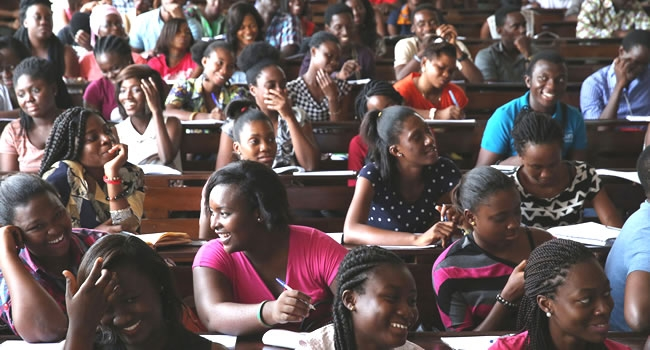The Nigerian Government has drawn its latest cut-off at age 16 as Nigeria’s minimum admission age for entry into tertiary institutions, effective immediately.
This was announced by the Minister of Education, Dr. Tunji Alausa, during the 2025 policy meeting of the Joint Admissions and Matriculation Board (JAMB) held in Abuja on Tuesday.
Alausa explained that the decision of the government to set Nigeria’s minimum admission age at 16 is to ensure students are academically and emotionally mature before embarking on higher education.
The Minister also emphasized that the minimum admission age in Nigeria aligns with global best practices, citing studies that show younger students often struggle with the independence and academic demands of university life.
He said: “This policy decision reflects a balance between cognitive maturity and academic preparedness. 16 years is non-negotiable.
He, however, acknowledged that exceptions could be made for gifted students who have advanced academically ahead of their age group. But such cases, he said, must be documented and justified.
The Minister cautioned tertiary institutions against manipulating student age records to bypass the age limit.
He warned that institutions found altering age records would be sanctioned, reinforcing the seriousness of the new directive. Although no specific penalties were announced at the meeting, the Minister said enforcement would be strict.
In the Minster’s words: “The issue of age at entry into tertiary institutions has generated much debate, but our position is clear.”
“The entry age for admission into tertiary institutions is now officially pegged at 16 years. It was reduced from 18, which was to be effective from this year’s exercise, to the need for this compliance.
“This policy decision reflects a balance between cognitive maturity and academic preparedness. Sixteen years of age for admission is non-negotiable. Institutions are hereby directed to ensure strict compliance.
“We understand there may be a few exceptional cases, and provisions have already been made for legitimate exceptions, especially for gifted children or those with accelerated educational progress.
“However, this must be demonstrated and documented, and it must be justified.
“The ministry is firm in its resolve, and those attempting to circumvent this policy by altering age records will be sanctioned accordingly.” Alausa explained.
Recall that in early 2024, under sacked Education Minister Prof. Tahir Mamman, the Federal Government introduced an 18‑year minimum age requirement for university admission. The policy also extended to NECO and WAEC exam eligibility, with provisions blocking under-18 candidates from taking those exams starting that year
However, the announcement triggered widespread backlash from parents, educators, school heads, and even the National Assembly, who argued it would unfairly exclude academically qualified 16‑ and 17‑year‑olds.
As pressure mounted, Mamman softened the stance by allowing under‑18 candidates for the 2024 admissions but maintained that the age floor would apply strictly in 2025.
The abrupt shift was reversed after the October 2024 cabinet reshuffle that elevated Alausa, formerly Minister of State for Health, to lead the Education Ministry.





